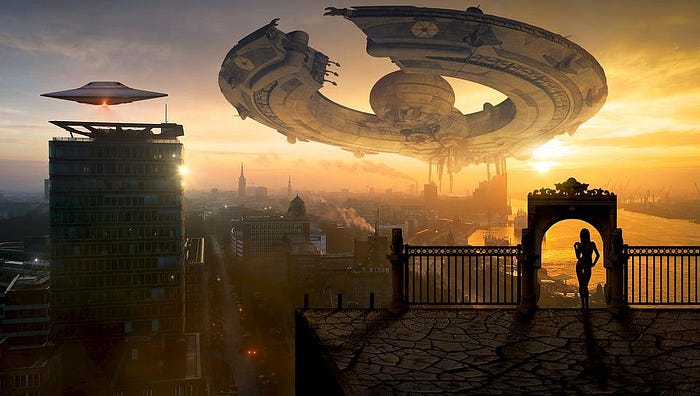 |
| KELLEPICS @Pixbay |
Science-fiction books are some of the best types of books that you can read if you like to stimulate your imagination. It gives you a new way to look at the world and increases your innovation capacity. I personally love science-fiction books more than any other genre. That’s why I will give you the best series that you should read. Heads up, most series will be related to space and artificial intelligence!
| A Space Odyssey series — Arthur C. Clarke |
#5 A Space Odyssey — Arthur C. Clarke
The plot starts with a mysterious monolith placed by an alien civilization on different worlds in a universe, to monitor and help future civilizations to evolve. For humanity, this monolith was the way in which they developed intelligence — in the form of building tools to aid their survival — in the prehistoric age when the first apes discovered it on Terra. The second one got discovered on the moon and it enabled space travel. I will let the rest of the plot be found out by you.This series contains themes like AI, Space, Space-Travel, Aliens, and many more.
These 2 movies were made after the books namely 2001: A Space Odyssey (1968) and 2010: The Year We Make Contact (1984). You can watch them first or read the books first, as you like to do it.
The reading order is as follows:(optional) The Sentinel (1951), Encounter in the Dawn (1953);
- 2001: A Space Odyssey (1968);
- 2010: Odyssey 2 (1982);
- 2061: Odyssey 3 (1987);
- 3001: The Final Odyssey (1997).
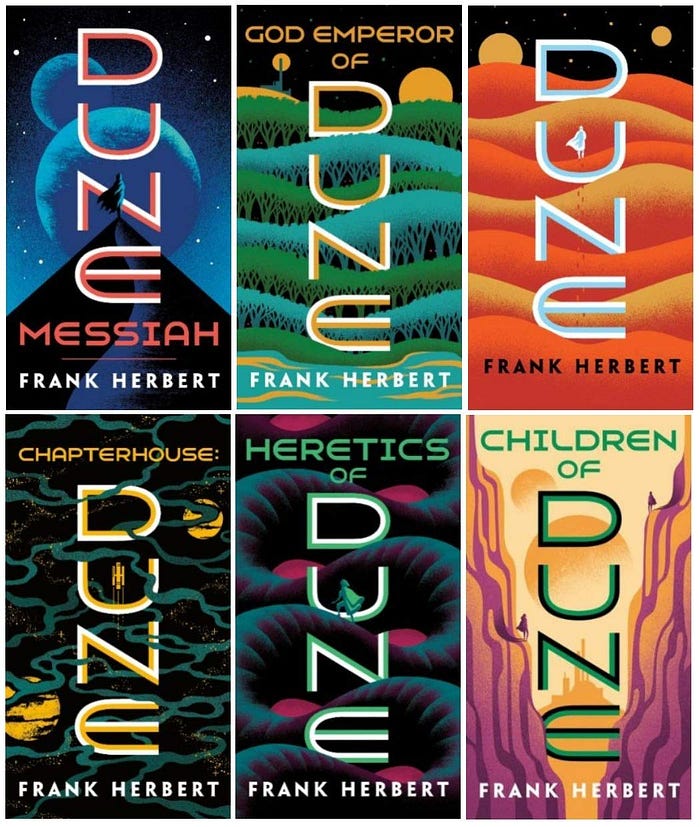
#4 Dune series — Frank Herbert
Dune is the best-selling science-fiction novel in history, by some accounts. There is also an older movie based on the novels and a newer movie that you can watch before you start reading. But hey, if you are a book-first type, jump right into the book series!
The universe of Dune is set in the future, where all “thinking machines” were banned from ever being built or used. A lame future if you ask me (I love artificial intelligence) — but the series is so good, I will make a compromise.
In the place of those “thinking machines” superior individuals called “mentats” were created, that have advanced mental and physical capabilities.
Those capabilities are based on a substance called “Spice” or "Menange" that is found only on one planet — Arrakis. The “Spice” is also used in space travel, which makes it critical to the Galactic Empire. This spice is created by some creatures called Sandworms. As you can imagine, the whole universe fights over that planet and its inhabitants, the Fremen, who want to free their planet from all oppressors.
I highly recommend that you read the Dune (1965) book before diving into the series in Dune-universe’s chronological order.
The rest you will read in the book series, which you should read in the following order:
- The Butlerian Jihad (2002);
- The Machine Crusade (2003);
- The Battle of Corrin (2004);
- Sisterhood of Dune (2011);
- Mentats of Dune (2014);
- Navigators of Dune (2016);
- House Atreides (1999);
- House Harkonnen (2000);
- House Corrino (2001);
- The Duke of Caladan (2020);
- The Lady of Caladan (2021);
- The Heir of Caladan (2022);
- Dune (1965);
- Paul of Dune (2008);
- Dune Messiah (1969);
- The Winds of Dune (2009);
- Children of Dune (1976);
- God Emperor of Dune (1981);
- Heretics of Dune (1984);
- Chapterhouse: Dune (1985);
- Hunters of Dune (2006);
- Sandworms of Dune (2007);
Quite a long list, I know! So get to reading!
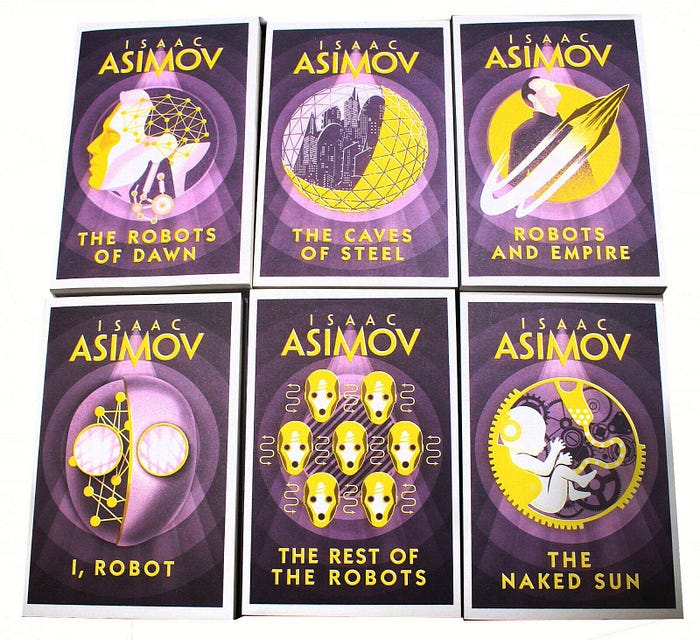 |
| Robot Series — Isaac Asimov |
#3 Asimov’s Robots
Asimov is my favorite science-fiction book author. This is mainly because he writes about my 2 favorite topics — artificial intelligence and space. He wrote over 500 books during his career and is the most influential artificial intelligence science-fiction novelist.If you are into artificial intelligence and robots, like me, I would highly recommend reading the Robots series. The stories in the book follow the “life” of R. Daneel Olivaw. I will let you discover what it is all about!
The reading order for the Robots series according to Asimov himself is:
- (optional) Robot Dreams (1986), Robot Visions (1990), The Rest of the Robots (1964), Gold: The Final Science Fiction Collection (1995), Nemesis (1989);
- I, Robot (1950);
- Mother Earth (1949);
- The Positronic Man(1992);
- The Complete Robot (1982);
- Caves of steel (1954);
- The Naked Sun (1957);
- The Robots of Dawn (1983);
- Robots and Empire (1985).
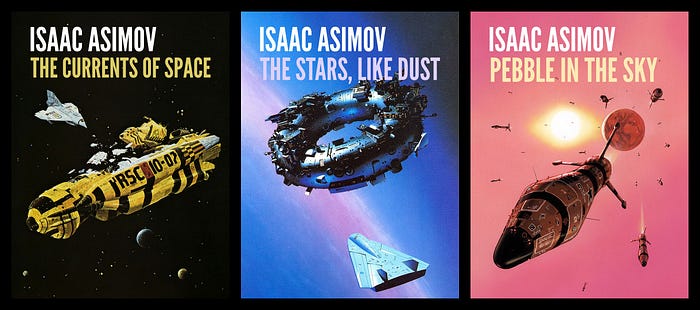 |
| Empire Series — Isaac Asimov |
#2 Asimov’s Empire
If you like Asimov’s writing, then you can continue reading the Empire series. This series explains follows the world where a human galactic empire exists. It has themes centered around technologies like Hyperdrives, blaster pistols, Neuronic Whips, and other sci-fi tech. It also describes space and planets, if you are into that.The reading order for this series is:
- The Stars, Like Dust (1951)
- The Currents of Space (1952)
- Pebble in the Sky (1950)
- Blind Alley (1945)
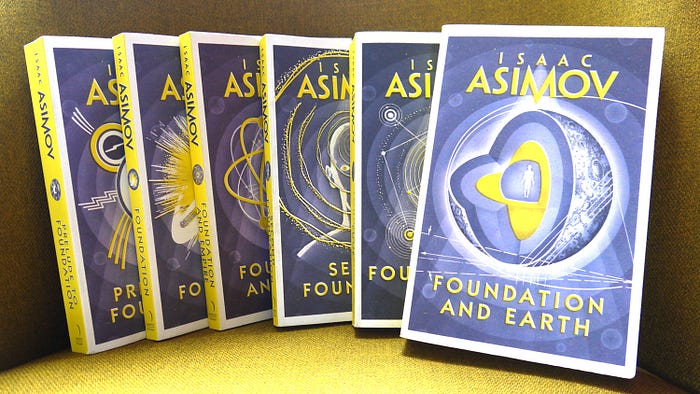 |
| Foundation Series — Isaac Asimov |
#1 Asimov’s Masterpiece — The Foundation series
Last but certainly not least, the series Asimov is most known for, the Foundation Series. The story is centered around one mathematician named Hari Seldon. This mathematician is working on a new science called psychohistory, a type of sociology that uses mathematics to predict the future of human civilization. He predicts that the Empire (from the Empire series) will fall, giving birth to a dark age lasting 30 000 years. He wants to “deflect” a bit the series of events, so he starts an organization called The Foundation — formed of the best scientists and engineers alive.
Hope I intrigued you enough to read this series. Those books are absolute masterpieces! The reading order is as follows:
- Prelude to Foundation (1988)
- Forward the Foundation (1993)
- Foundation (1951)
- Foundation and Empire (1952)
- Second Foundation (1953)
- Foundation’s Edge (1982)
- Foundation and Earth (1986)
- The End of Eternity (1955)
Conclusion
We all need to escape sometimes from the real world. I hope the series I presented here will give you a few tens of hours of joy in this strange life and get you on the path of really enjoying science fiction literature — if you don’t already.I realize that 3 of the 5 series in this article are about Asimov. I am biased in this aspect since, as I stated at the start of the article, he is my favorite science-fiction novelist. I hope you will enjoy reading his books as much as I did.
Now go! You have some reading and imagining to do!
Happy reading!
Comments
Post a Comment